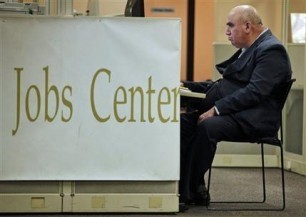WASHINGTON - The number of newly laid-off workers requesting unemployment benefits rose more than expected last week as jobs remain scarce amid a sluggish economic recovery.
The Labor Department said Thursday new claims for unemployment insurance rose by 11,000 to a seasonally adjusted 444,000. Wall Street economists polled by Thomson Reuters expected an increase of only 3,000.
The rise was partly a result of large seasonal layoffs in the retail, manufacturing and construction industries, a Labor Department analyst said. The second week of January usually sees the largest increase in claims, unadjusted for seasonal trends, during the year, the analyst said.
Still, the increase didn't disrupt the longer-term downward trend in claims. The four-week average dropped to 440,750, its 19th straight drop and lowest level since August 2008.
Initial claims are considered a gauge of the pace of layoffs and an indication of companies' willingness to hire new workers.
Claims have dropped steadily since last fall, as companies cut fewer jobs, raising hopes that hiring may increase soon. Initial claims have dropped by nearly 90,000, or 17 percent, since late October. Two weeks ago, new claims dropped to their lowest level since July 2008.
Despite the recent drop, the economy is not yet consistently generating net increases in jobs. The Labor Department said last week that employers cut 85,000 jobs in December, after adding only 4,000 in November. November's increase was the first in nearly two years. The unemployment rate was unchanged at 10 percent.
Many economists say the four week average of claims will need to fall to below 425,000 to signal that the economy is close to generating net job gains.
Meanwhile, the number of people continuing to claim benefits dropped sharply to 4.6 million from 4.8 million the previous week. The continuing claims data lags initial claims by a week.
But the so-called continuing claims do not include millions of people who have used up the regular 26 weeks of benefits customarily provided by states, and are receiving extended benefits for up to 73 additional weeks, paid for by the federal government.
More than 5.3 million people were receiving extended benefits in the week ended Dec. 26, the latest data available. That's a drop of about 135,000 from the previous week.
The increasing number of people claiming extended unemployment insurance indicates that even as layoffs are declining, hiring hasn't picked up. That leaves people out of work for longer and longer periods of time.
Some employers are continuing to cut jobs. The struggling Internet company AOL Inc. said Monday it will lay off up to 1,200 employees.
Among the states, New York reported the largest increase in claims, with 22,810, which it attributed to higher layoffs in the construction, service and transportation industries. North Carolina, Georgia, Wisconsin and Alabama reported the next largest increases. The state data lags initial claims by a week.
Illinois had the largest drop, with 6,928, which it attributed to fewer layoffs in the construction and manufacturing industries. Florida, Kansas, Maryland and California had the next largest decreases.
RETAIL SALES DOWN
Retail sales fell in December as demand for autos, clothing and appliances all slipped, a disappointing finish to a year in which sales dropped by the largest amount in 27 years of records.
The weakness in consumer demand highlighted the formidable hurdles facing the economy as it struggles to recover from the deepest recession in seven decades.
The Commerce Department said Thursday that retail sales declined 0.3 percent in December compared November, much weaker than the 0.5 percent rise that economists had been expecting. Excluding autos, sales dropped by 0.2 percent, also weaker than the 0.3 percent rise analyst had forecast.
For the year, sales were down 6.2 percent, the biggest decline on records that go back to 1992. The only other year that sales had fallen was 2008, when they slipped by 0.5 percent.
Friday
July 11th, 2025
11:35PM









